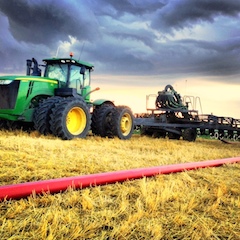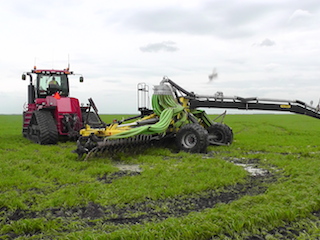Doug Redekop, president and general manager of Steinbach based Precision Pumping, a custom swine manure applicator is calling for more open reporting of PED virus to give those who provide services to the swine industry the best opportunity to avoid spreading the infection.
Under more stringent Manitoba government regulations, the swine manure fertilizer application season runs from April 10 to November 10, no sooner and no later.

Redekop says to reduce the risk of transmitting PED virus from one farm to another, custom swine manure applicators use strategies to eliminate any contact between manure application equipment or personnel and anyone or anything that might come into contact with pigs.
“People are quite concerned about the epidemic, especially since so many herds broke with it in the U.S. and closer to home in Ontario so that it’s high on the radar,” he said. “But what I will say is as the weeks go on and we don’t have any new cases, I have a feeling that people start to get a bit complacent.”
Redekop says since PED is a reportable disease within Manitoba, he hopes as being a service provider for the industry, they could help remove or petition the removal of this cloak of secrecy around the announcements of new cases.
“This way, we could do our best to try to minimize the transmission of disease if and when there are new farms identified. That to me is critical,” he said.
Redekop says, if custom applicators can have roadway access away from the barn and the opportunity to wash and disinfect the equipment that has come into contact with the lagoon and any heavily manure equipment in the field, th at will do a lot to minimize the transmission risk.
at will do a lot to minimize the transmission risk.
 at will do a lot to minimize the transmission risk.
at will do a lot to minimize the transmission risk.
He says the cooperative, Precision Pumping, around for at least 20 years is giving a lot more thought to the farms they services daily.
“Our focus is always to start at the top of a health pyramid, i.e. either the nucleus or sow barn and then work our way down within the pyramid,” said Redekop. “This gives us some assurances the health statuses are constant within that pyramid and we communicate directly with our customer and nutrient planner with the health status and all of those factors play a role. That’s number one.”
Secondly, the cooperative invested in a wash trailer with holding water specifically to wash equipment. To work closely with the farm to identify critical areas to stay away from, i.e. the roadways in close proximity to the barn offices and feed bins.
“We ask for separate driveway access to the lagoons to stay as far away as possible from the normal day to day activities of the farm and also washing and disinfecting a lot more frequently than we were prior to this breakout,” he said.
Redekop says so far, Manitoba has identified only two cases on farms in Manitoba and his fear is that as time passes with no new cases that complacency could set in, and encourages the industry to work even more closely, while stepping up the bio-security protocol.
In conjunction with this, a survey of custom swine manure applicators shows they are communicating more with their clients and taking more time planning manure applications in an effort to reduce the risk of spreading PED.
The Manitoba Livestock Manure Management Initiative released the first results from their survey together with the University of Wisconsin Madison.
The Manitoba Livestock Manure Management Initiative released the first results from their survey together with the University of Wisconsin Madison.
MLMMI executive director John Carney says the survey asks custom manure applicators about changes they’re making in their practices to manage and prevent the spread of PED, the challenges, and how it’s working.
“One of the first things, and I don’t think anybody will be surprised to hear this, there’s a lot of conversations taking place between hog producers and their commercial manure applicators about how to contain the spread of this virus,” said Carney. “We’re seeing significantly more time going into planning the manure application, discussions taking place between the farm and the manure applicator about when are you coming, where have you been, what are you going to do, and who’s coming?” •
— By Harry Siemens
“One of the first things, and I don’t think anybody will be surprised to hear this, there’s a lot of conversations taking place between hog producers and their commercial manure applicators about how to contain the spread of this virus,” said Carney. “We’re seeing significantly more time going into planning the manure application, discussions taking place between the farm and the manure applicator about when are you coming, where have you been, what are you going to do, and who’s coming?” •
— By Harry Siemens





